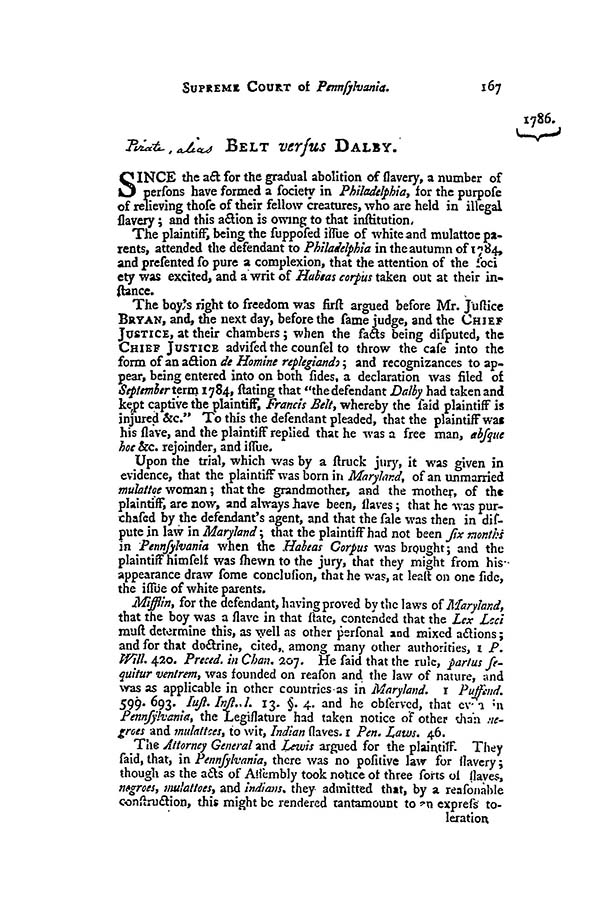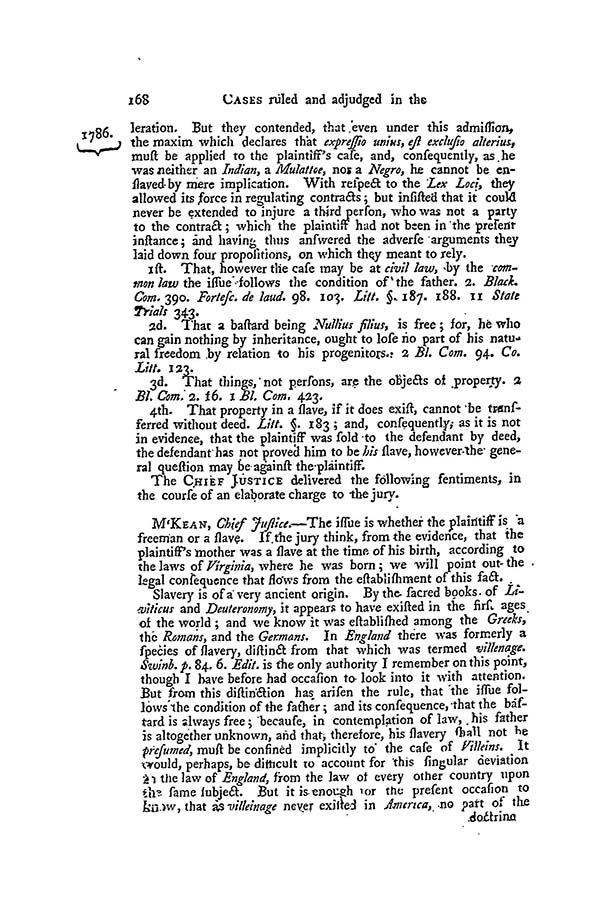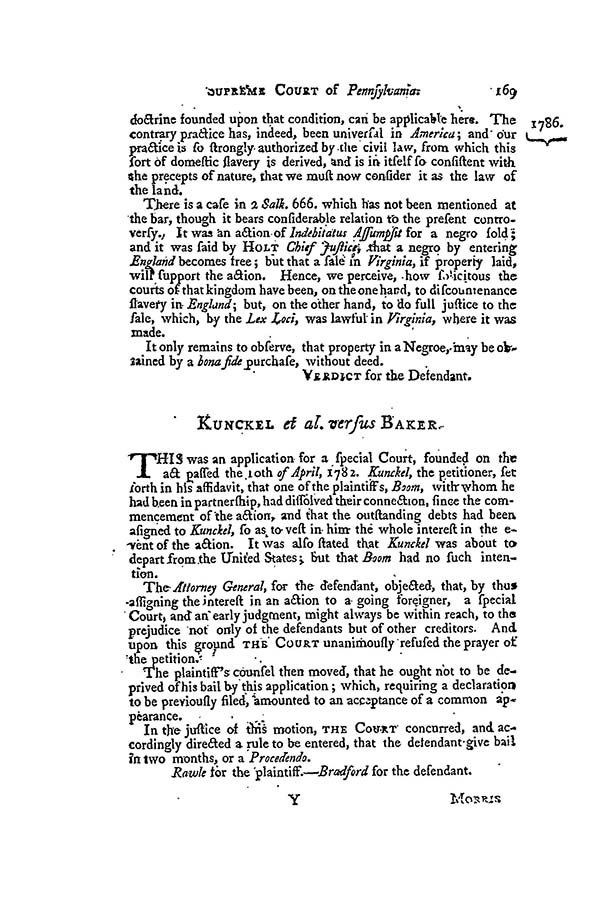Belt v. Dalby, 1 Dall. 167 (Pa. 1786)
Supreme Court of Pennsylvania.
April Term, 1786.
Belt versus Dalby.
Since the act for the gradual abolition of slavery, a number of persons have formed a society in Philadelphia, for the purpose of relieving those of their fellow creatures, who are held in illegal slavery; and this action is owing to that institution.
The plaintiff, being the supposed issue of white and mulattoe parents, attended the defendant to Philadelphia in the autumn of 1784, and presented so pure a complexion, that the attention of the society was excited, and a writ of Habeas corpus taken out at their instance.
The boy's right to freedom was first argued before Mr. Justice Bryan, and, the next day, before the same judge, and the Chief Justice, at their chambers; when the facts being disputed, the Chief Justice advised the counsel to throw the case into the form of an action de Homine replegiando; and recognizances to appear, being entered into on both sides, a declaration was filed of September term 1784, stating that "the defendant Dalby had taken and kept captive the plaintiff, Francis Belt, whereby the said plaintiff is injured &c." To this the defendant pleaded, that the plaintiff was his slave, and the plaintiff replied that he was a free man, absque hoc &c. rejoinder, and issue.
Upon the trial, which was by a struck jury, it was given in evidence, that the plaintiff was born in Maryland, of an unmarried mulattoe woman; that the grandmother, and the mother, of the plaintiff, are now, and always have been, slaves; that he was purchased by the defendant's agent, and that the sale was then in dispute in law in Maryland; that the plaintiff had not been six months in Pennsylvania when the Habeas Corpus was brought; and the plaintiff himself was shown to the jury, that they might from his appearance draw some conclusion, that he was, at least on one side, the issue of white parents.
Mifflin, for the defendant, having proved by the laws of Maryland, that the boy was a slave in that state, contended that the Lex Loci must determine this, as well as other personal and mixed actions; and for that doctrine, cited, among many other authorities, 1 P. Will. 420. Preced. in Chan. 207. He said that the rule, partus sequitur ventrem, was founded on reason and the law of nature, and was as applicable in other countries as in Maryland. 1 Puffend. 599. 693. Iust. Inst. L. 13. §. 4. and he observed, that even in Pennsylvania, the Legislature had taken notice of other than negroes and mulattoes, to wit, Indian slaves. 1 Pen. Laws. 46.
The Attorney General and Lewis argued for the plaintiff. They said, that, in Pennsylvania, there was no positive law for slavery; though as the acts of Assembly took notice of three sorts of slaves, negroes, mulattoes, and indians. they admitted that, by a reasonable construction, this might be rendered tantamount to an express to- 1 U.S. 167, 168 leration. But they contended, that even under this admission, the maxim which declares that expressio unius, est exclusio alterius, must be applied to the plaintiff's case, and, consequently, as he was neither an Indian, a Mulattoe, nor a Negro, he cannot be enslaved by mere implication. With respect to the Lex Loci, they allowed its force in regulating contracts; but insisted that it could never be extended to injure a third person, who was not a party to the contract; which the plaintiff had not been in the present instance; and having thus answered the adverse arguments they laid down four propositions, on which they meant to rely.
1st. That, however the case may be at civil law, by the common law the issue follows the condition of the father. 2. Black. Com. 390. Fortesc. de laud. 98. 103. Litt. §. 187. 188. 11 state Trials 343.
2d. That a bastard being Nullius filius, is free; for, he who can gain nothing by inheritance, ought to lose no part of his natural freedom by relation to his progenitors. 2 Bl. Com. 94. Co. Litt. 123.
3d. That things, not persons, are the objects of property. 2 Bl. Com. 2. 16. 1 Bl. Com. 423.
4th. That property in a slave, if it does exist, cannot be transferred without deed. Litt. §. 183; and, consequently, as it is not in evidence, that the plaintiff was sold to the defendant by deed, the defendant has not proved him to be his slave, however the general question may be against the plaintiff.
The Chief Justice delivered the following sentiments, in the course of an elaborate charge to the jury.
M'Kean, Chief Justice.—The issue is whether the plaintiff is a freeman or a slave. If the jury think, from the evidence, that the plaintiff's mother was a slave at the time of his birth, according to the laws of Virginia, where he was born; we will point out the legal consequence that flows from the establishment of this fact.Slavery is of a very ancient origin. By the sacred books of Liviticus and Deuteronomy, it appears to have existed in the first ages of the world; and we know it was established among the Greeks, the Romans, and the Germans. In England there was formerly a species of slavery, distinct from that which was termed villenage. Swinb. p.84.6. Edit. is the only authority I remember on this point, though I have before had occasion to look into it with attention. But from this distinction has arisen the rule, that the issue follows the condition of the father; and its consequence, that the bastard is always free; because, in contemplation of law, his father is altogether unknown, and that, therefore, his slavery shall not be presumed, must be confined implicitly to the case of Villeins. It would, perhaps, be difficult to account for this singular deviation in the law of England, from the law of every other country upon the same subject. But it is enough for the present occasion to know, that as villeinage never existed in America, no part of the
There is a case in 2 Salk. 666. which has not been mentioned at the bar, though it bears considerable relation to the present controversy. It was an action of Indebitatus Assumpsit for a negro sold; and it was said by Holt Chief Justice, that a negro by entering England becomes free; but that a sale in Virginia, if properly laid, will support the action. Hence, we perceive, how solicitous the courts of that kingdom have been, on the one hand, to discountenance slavery in England; but, on the other hand, to do full justice to the sale, which, by the Lex Loci, was lawful in Virginia, where it was made.
It only remains to observe, that property in a Negroe, may be obtained by a bona fide purchase, without deed.
Verdict for the Defendant.
Citation: Belt v. Dalby, 1 Dall. 167, 1 U.S. 167 (Pa. 1786).



Last modified: December 5, 2014